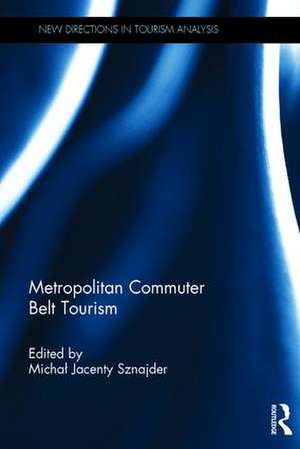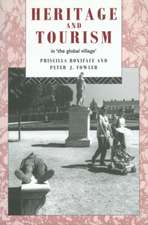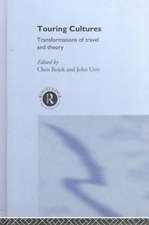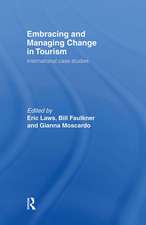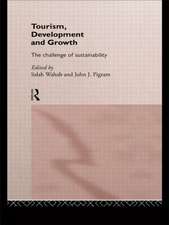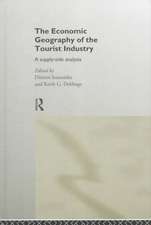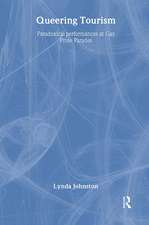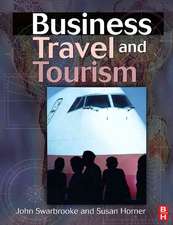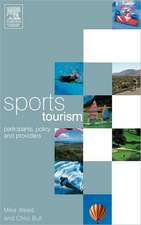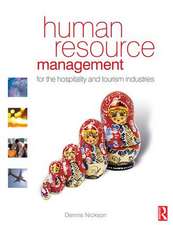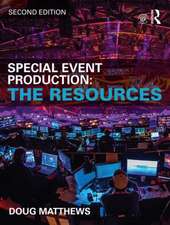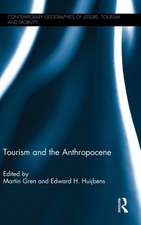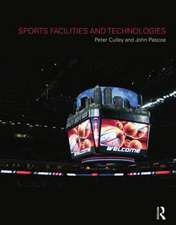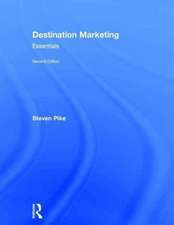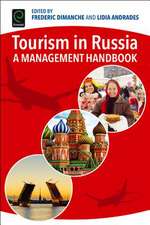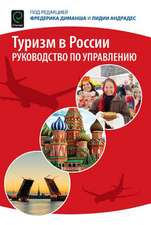Metropolitan Commuter Belt Tourism: New Directions in Tourism Analysis
Editat de Michał Jacenty Sznajderen Limba Engleză Hardback – 16 mai 2017
This book establishes a current inventory and appropriate future selection of commuter belt tourism products for metropolitan areas. It also explains how public and private resources can be combined to achieve synergistic effects in tourism promotion and provides a structural analysis for the proper management of tourist organisations in metropolitan areas. Additionally, there is insight into how the development of metropolitan areas affects rural tourism and agritourism within broader social, economic and environmental relations. The issue of the growth of metropolitan areas, which is a complex and multifaceted challenge, is elaborated on with diverse examples in Poland and further afield.
This is valuable reading for students, researchers and academics of tourism, as well as rural and urban studies, business management, farm management, and leisure studies.
| Toate formatele și edițiile | Preț | Express |
|---|---|---|
| Paperback (1) | 259.98 lei 6-8 săpt. | |
| Taylor & Francis – 13 iun 2022 | 259.98 lei 6-8 săpt. | |
| Hardback (1) | 764.20 lei 6-8 săpt. | |
| Taylor & Francis – 16 mai 2017 | 764.20 lei 6-8 săpt. |
Din seria New Directions in Tourism Analysis
-
 Preț: 394.09 lei
Preț: 394.09 lei - 18%
 Preț: 1055.51 lei
Preț: 1055.51 lei - 14%
 Preț: 312.43 lei
Preț: 312.43 lei - 18%
 Preț: 1052.35 lei
Preț: 1052.35 lei - 14%
 Preț: 338.06 lei
Preț: 338.06 lei -
 Preț: 469.34 lei
Preț: 469.34 lei - 15%
 Preț: 420.64 lei
Preț: 420.64 lei - 18%
 Preț: 1054.71 lei
Preț: 1054.71 lei - 26%
 Preț: 764.20 lei
Preț: 764.20 lei - 31%
 Preț: 767.74 lei
Preț: 767.74 lei -
 Preț: 474.14 lei
Preț: 474.14 lei -
 Preț: 489.26 lei
Preț: 489.26 lei -
 Preț: 469.34 lei
Preț: 469.34 lei - 18%
 Preț: 1054.71 lei
Preț: 1054.71 lei - 18%
 Preț: 1005.01 lei
Preț: 1005.01 lei -
 Preț: 469.34 lei
Preț: 469.34 lei - 25%
 Preț: 767.88 lei
Preț: 767.88 lei - 26%
 Preț: 847.73 lei
Preț: 847.73 lei - 28%
 Preț: 877.59 lei
Preț: 877.59 lei - 18%
 Preț: 1054.71 lei
Preț: 1054.71 lei - 18%
 Preț: 1063.41 lei
Preț: 1063.41 lei - 26%
 Preț: 765.40 lei
Preț: 765.40 lei -
 Preț: 469.34 lei
Preț: 469.34 lei - 24%
 Preț: 321.28 lei
Preț: 321.28 lei - 13%
 Preț: 334.55 lei
Preț: 334.55 lei -
 Preț: 469.34 lei
Preț: 469.34 lei -
 Preț: 323.23 lei
Preț: 323.23 lei - 28%
 Preț: 741.53 lei
Preț: 741.53 lei - 26%
 Preț: 736.38 lei
Preț: 736.38 lei - 18%
 Preț: 1053.16 lei
Preț: 1053.16 lei - 14%
 Preț: 338.61 lei
Preț: 338.61 lei - 26%
 Preț: 764.20 lei
Preț: 764.20 lei - 25%
 Preț: 768.46 lei
Preț: 768.46 lei - 18%
 Preț: 1000.27 lei
Preț: 1000.27 lei
Preț: 764.20 lei
Preț vechi: 1102.76 lei
-31% Nou
Puncte Express: 1146
Preț estimativ în valută:
146.23€ • 152.67$ • 121.02£
146.23€ • 152.67$ • 121.02£
Carte tipărită la comandă
Livrare economică 05-19 aprilie
Preluare comenzi: 021 569.72.76
Specificații
ISBN-13: 9781472464866
ISBN-10: 1472464869
Pagini: 340
Ilustrații: 112
Dimensiuni: 156 x 234 x 26 mm
Greutate: 0.45 kg
Ediția:1
Editura: Taylor & Francis
Colecția Routledge
Seria New Directions in Tourism Analysis
Locul publicării:Oxford, United Kingdom
ISBN-10: 1472464869
Pagini: 340
Ilustrații: 112
Dimensiuni: 156 x 234 x 26 mm
Greutate: 0.45 kg
Ediția:1
Editura: Taylor & Francis
Colecția Routledge
Seria New Directions in Tourism Analysis
Locul publicării:Oxford, United Kingdom
Cuprins
List of figures
List of tables
Notes on contributors
Acknowledgments
Introduction
Part I. Metropolisation and suburban tourism
1. Ecumenopolis commuter belt tourism
Michał Jacenty Sznajder
2. Trends and conditions of the development of submetropolitan tourism
Michał Gazdecki and Michał Jacenty Sznajder
3. Case study: the Submetropolitan Błędów Desert, an ambivalent approach to devastation of the natural environment
Michał Jacenty Sznajder
4. Case study: vague hope for suburban tourism in Conakry Afrometropolis
Michał Jacenty Sznajder
Part II. New paradigms and opportunities for metropolitan commuter belt tourism
5. Tourism in submetropolitan areas analysed by selected theories of economics and regional development
Agata Balińska
6. Strengthening the sustainability of rural tourism and agritourism in the twenty-first century
Adriano Ciani
7. New rural tourism paradigm in submetropolitan areas
Klaus Ehrlich
8. Normative modelling in coordination of generic and private tourism promotion in submetropolitan areas
Michał Jacenty Sznajder and Sylwia Marek
9. The concept of rural tourism and agritourism
Michał Jacenty Sznajder
10. Building a tourism palace: agritourism in metropolitan areas as another stone in the mosaic? The case of Slovenia
Irma Potočnik Slavič
11. The forthcoming ICT revolution in tourism in metropolitan areas
Piotr Senkus
Part III. Natural resources in metropolitan and submetropolitan areas
12. Tourism valorisation of metropolitan areas based on their natural resources
Monika Wojcieszak and Michał Jacenty Sznajder
13. Kampinos National Park as a tourism attraction for Warsaw metropolitan areas
Katarzyna Mikrut
14. Kampinos National Park as a place of recreation for Warsaw inhabitants
Katarzyna Dzioban
15. Otulina: agritourism in the Warsaw metopolitan area
Ewa Tyran
Part IV. Types of tourism and tourist segments in metropolitan commuter belt
16. Forms of rural tourism in metropolitan areas
Janusz Majewski
17. Holiday tourism in metropolitan areas
Andrzej Piotr Wiatrak
18. Social farming-based tourism from the perspective of metropolitan areas
Elżbieta Kmita-Dziasek
19. Pilgrimaging and religious tourism in metropolitan areas
Michał Jacenty Sznajder
20. Agritourism in Kraków metropolitan areas: a case study
Józef Kania and Małgorzata Bogusz
21. A pedagogical and psychological exegesis of tourism
Andrzej Kusztelak
Part V. Portfolio offer for tourism in submetropolitan areas
22. Traditional and modern tour operators in agritourism
Jarosław Uglis and Joanna Kosmaczewska
23. A model of agritourism offer polarisation in metropolitan surroundings - the Łódź Metropolis: a case study
Jolanta Wojciechowska
24. The basket of tourism products and services offered on the Internet by agritourism farms in selected European countries
Michał Jacenty Sznajder and Milena Malinowska
25. Internet product and service offers by agritourism farms located in four metropolitan areas in Poland
Michał Jacenty Sznajder and Damian Dudziak
26. Risk in rural tourism and agritourism
Jan Sikora
27. Tourist segmentation in rural tourism and agritourism in metropolitan areas
Arkadiusz Niedziółka
28. Conclusion
Michał Jacenty Sznajder
Glossary
Index
List of tables
Notes on contributors
Acknowledgments
Introduction
Part I. Metropolisation and suburban tourism
1. Ecumenopolis commuter belt tourism
Michał Jacenty Sznajder
2. Trends and conditions of the development of submetropolitan tourism
Michał Gazdecki and Michał Jacenty Sznajder
3. Case study: the Submetropolitan Błędów Desert, an ambivalent approach to devastation of the natural environment
Michał Jacenty Sznajder
4. Case study: vague hope for suburban tourism in Conakry Afrometropolis
Michał Jacenty Sznajder
Part II. New paradigms and opportunities for metropolitan commuter belt tourism
5. Tourism in submetropolitan areas analysed by selected theories of economics and regional development
Agata Balińska
6. Strengthening the sustainability of rural tourism and agritourism in the twenty-first century
Adriano Ciani
7. New rural tourism paradigm in submetropolitan areas
Klaus Ehrlich
8. Normative modelling in coordination of generic and private tourism promotion in submetropolitan areas
Michał Jacenty Sznajder and Sylwia Marek
9. The concept of rural tourism and agritourism
Michał Jacenty Sznajder
10. Building a tourism palace: agritourism in metropolitan areas as another stone in the mosaic? The case of Slovenia
Irma Potočnik Slavič
11. The forthcoming ICT revolution in tourism in metropolitan areas
Piotr Senkus
Part III. Natural resources in metropolitan and submetropolitan areas
12. Tourism valorisation of metropolitan areas based on their natural resources
Monika Wojcieszak and Michał Jacenty Sznajder
13. Kampinos National Park as a tourism attraction for Warsaw metropolitan areas
Katarzyna Mikrut
14. Kampinos National Park as a place of recreation for Warsaw inhabitants
Katarzyna Dzioban
15. Otulina: agritourism in the Warsaw metopolitan area
Ewa Tyran
Part IV. Types of tourism and tourist segments in metropolitan commuter belt
16. Forms of rural tourism in metropolitan areas
Janusz Majewski
17. Holiday tourism in metropolitan areas
Andrzej Piotr Wiatrak
18. Social farming-based tourism from the perspective of metropolitan areas
Elżbieta Kmita-Dziasek
19. Pilgrimaging and religious tourism in metropolitan areas
Michał Jacenty Sznajder
20. Agritourism in Kraków metropolitan areas: a case study
Józef Kania and Małgorzata Bogusz
21. A pedagogical and psychological exegesis of tourism
Andrzej Kusztelak
Part V. Portfolio offer for tourism in submetropolitan areas
22. Traditional and modern tour operators in agritourism
Jarosław Uglis and Joanna Kosmaczewska
23. A model of agritourism offer polarisation in metropolitan surroundings - the Łódź Metropolis: a case study
Jolanta Wojciechowska
24. The basket of tourism products and services offered on the Internet by agritourism farms in selected European countries
Michał Jacenty Sznajder and Milena Malinowska
25. Internet product and service offers by agritourism farms located in four metropolitan areas in Poland
Michał Jacenty Sznajder and Damian Dudziak
26. Risk in rural tourism and agritourism
Jan Sikora
27. Tourist segmentation in rural tourism and agritourism in metropolitan areas
Arkadiusz Niedziółka
28. Conclusion
Michał Jacenty Sznajder
Glossary
Index
Notă biografică
Michał Jacenty Sznajder is Professor, rural economist, former Dean of the Faculty of Economics and Social Sciences, and Head of the Department of Market and Marketing at Poznan University of Life Sciences, Poland.
Descriere
Investigating metropolitan regions as a present location and driver of the development of rural tourism, agritourism, food tourism and nature tourism, this book analyses the major economic, social, political and managerial aspects of these types of tourism which occur within the rural-urban fringe. This book establishes a current inventory and appropriate future selection of rural tourism, agritourism, food tourism and nature tourism products for metropolitan areas. It also explains how public and private resources can be combined to achieve synergy effects in tourism promotion and provides a structural analysis for the proper management of tourist organisations in metropolitan areas.
